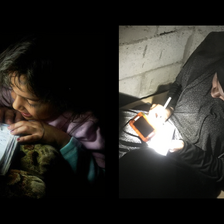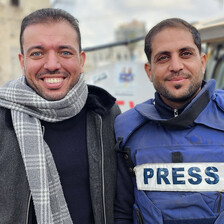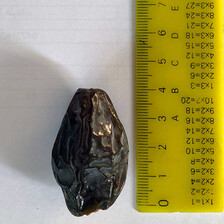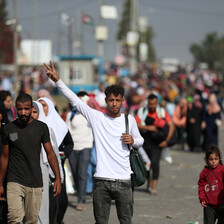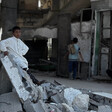The Electronic Intifada 8 October 2025
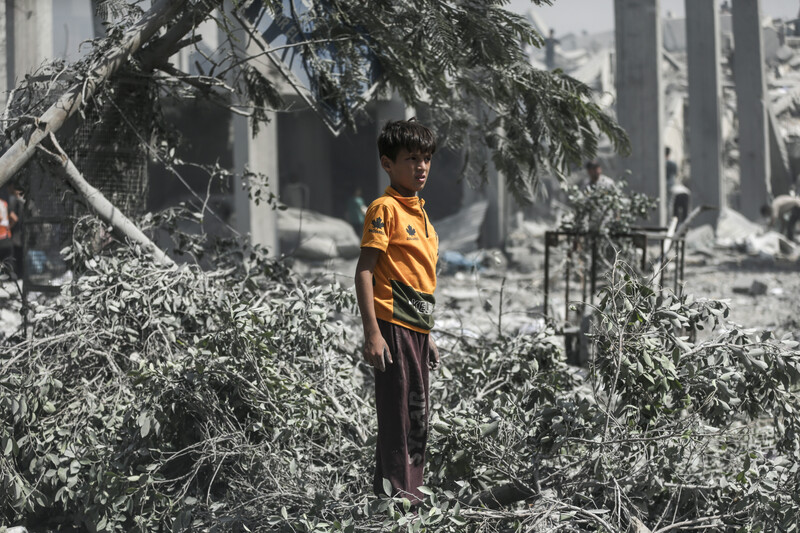
A Palestinian boy stands next to a destroyed tree after Israeli airstrikes targeted a house belonging to the al-Shawa family in Gaza City, 22 September.
ActiveStillsIn the brutal arena of history, Palestine has never been a heavy hitter.
Israel possesses the warplanes, the tanks, the surveillance networks and the unwavering backing of global superpowers. The battlefield is tilted, the referee biased. And yet, somehow, Palestinians are still here, demanding our rights and calling for our freedom – not because we overpower, but because we endure.
For colonized people like us, victory was never going to be a knockout punch. We never dreamed of winning in one decisive blow. The imbalance of power is too immense for such fantasies. But if history teaches anything, it’s that those who survive each round – bleeding but upright, sustained by clarity and collective purpose – are often the ones who endure until the final bell.
In January 2024, when the International Court of Justice issued its first set of provisional measures in the genocide case brought against Israel by South Africa, no one in Gaza expected the bombs to stop. We know Israel. We know its disdain for international law, its habitual defiance of UN resolutions, its impunity shored up by its powerful allies.
But we also know the value of speaking truth to power.
The ICJ ruling declaring that a genocide was plausibly underway in Gaza – despite its lack of enforcement – was a historic blow to Israel’s carefully manufactured image of morality and victimhood.
Global shift
Last month, four of Israel’s stalwart allies – the United Kingdom, Canada, Australia and France – announced their recognition of a State of Palestine. These were not the reliably principled Global South nations long sympathetic to our cause. These were core Western countries, historically colonial powers and once staunch defenders of Israel on every international stage.
The shift did not come out of nowhere. It came from the relentless sacrifices Palestinians have made over the past century, up to the unbearable level of brutality Israel has unleashed against civilians in Gaza. It came, too, from the rising pressure from global civil society voices demanding justice.
Some dismiss these largely symbolic recognitions as an attempt by these countries to whitewash their complicity in the genocide in Gaza, which remains ongoing. The recognition of Palestinian statehood carries little material impact for Palestinians in Gaza or the West Bank, where Israel is aggressively and systematically stealing more and more Palestinian land.
But even these symbolic gestures, which fall far short of the mark, are an important indicator of a global shift in our favor.
Recognition is not the end of our struggle. But it represents a crack in the wall, and with each crack, the wall is closer to coming down.
What’s happening now is more than political. It’s epistemic. It’s a war of narratives deciding who gets to define reality, whose suffering counts, whose voices are amplified.
For decades, Israel dominated the narrative. It set the parameters of discussion and held influence over much of the global media coverage. While that still holds true with the mainstream corporate media in the West, today, young Gazans with no electricity and shattered phones are speaking truths that millions are now hearing. Our narrative is breaking through – unfiltered, raw, undeniable.
And that is one of the most decisive shifts of all.
Synonym for suffering
In the long game of history, narrative matters.
Israel is rapidly losing the struggle for moral and political legitimacy. As global perceptions shift and sympathy grows for the Palestinian liberation struggle, the role of memory becomes even more vital. Children raised on truth and dignity do not forget. They carry stories like weapons, like seeds. And when the time comes, they use them to rebuild, to teach, to hold the world accountable.
Gaza has long been a synonym for suffering: besieged, bombed and starved. We have endured nearly two decades of blockade, multiple military aggressions, and for the past two years, a genocidal war – the most devastating in our lifetime. Hundreds of thousands displaced. Entire neighborhoods wiped off the map. Families incinerated in their sleep. And yet, amid all of this, we continue to live. To resist. To speak. To demand our rights. To insist on our freedom.
Ultimately, Israel’s aim is to break the will of Palestinians, and make us believe that resistance is worse than futile, that history has abandoned us, that the world has turned its back on us for good. That is the true purpose of the siege and the bombs and the orchestrated hunger: not just to kill bodies, but to kill the generational chain of the Palestinian narrative of dispossession, return and liberation. And yet the truth survives. And with it, so do we.
Israel’s current leadership speaks of “total victory” and “finishing the job.”
We don’t aspire to the brute power of our occupiers. We aspire to be steadfast. And there is no algorithm, satellite or bomb that can measure the power of a people who have decided not to die.
Our victory will not come because we are stronger, but because we are more rooted. Because we love this land more than anything else. Because we know the face of this land like we know the faces of our children. Because we have accepted the high price of freedom, and we pay it in grief, in bread shared between tents, in lullabies sung in the streets.
Milestones
We are not waiting for a final judgment from the World Court or a decisive vote at the UN. These are milestones, not destinations.
What we are waiting for is the day when injustice ends, criminals are held accountable and the world finally recognizes the Palestinians’ right of return and right to exercise self-determination throughout our historic homeland.
We don’t just fight to survive, we fight to remember, to rebuild, to belong. And we know that justice, though delayed, will not be denied forever.
When will that day come? Maybe sooner than we think.
After two years of unrelenting bloodshed in Gaza, the only dignified response is respect for our sacrifice, rather than any attempt to claim credit for our victory.
It must also be responded to with sustained, unwavering pressure on governments to halt the killing.
The priority now is to end the slaughter and save Gaza and those who remain. Everything else will follow.
Asem Alnabih is the spokesperson for Gaza Municipality, an engineer and PhD researcher currently based in Gaza City. He has written for many platforms in both Arabic and English.
